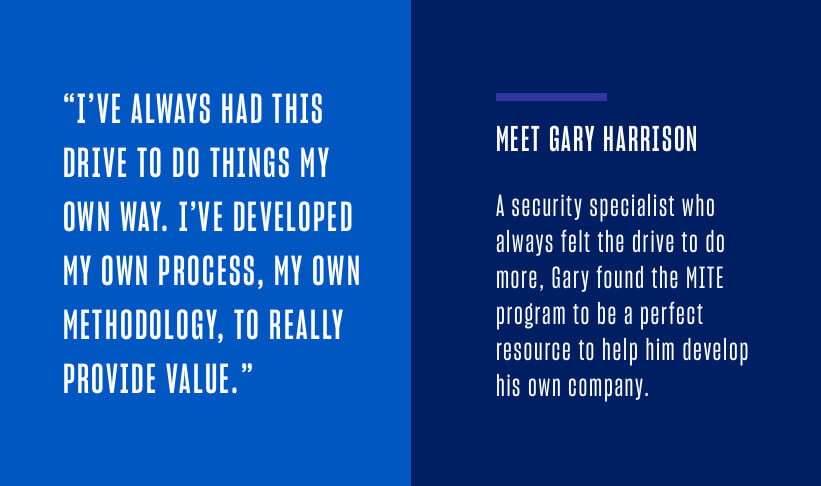If you’re thinking of starting a business or applying for your next job, there are a few key things you should do to maximize your chances of success:
- Build your resume of experience and skills
- Build your network of connections
- Build and refine your soft skills
The resume showcases who you are as a potential employee or partner, it’s like your own personal sales pitch. The second two resources, however, are just as important. “Who you know” is as vital as “what you know,” and building a network is an essential part of anyone’s career. Similarly, your array of “soft skills” – such as interpersonal communication and personal management, go a long way toward ensuring your success.
You could spend years building your skills and your network on your own or you could get a leg up and develop them through a higher-education program. If you are exploring graduate program possibilities to build these particular skills, then you’ll want to look into MBA programs that offer a focus in Entrepreneurship.
Let’s take an in-depth look at such graduate degree programs — including an exciting, newer alternative in the technology field that forward-looking MBA aspirants will want to consider.
Get Your Guide: The 4 Ways to Break Into a Tech Career (Plus 8 Lucrative Tech Careers to Pursue)
What Is an MBA in Entrepreneurship?
An MBA in Entrepreneurship is typically thought of as a Master of Business Administration (MBA) degree program with a concentration in Entrepreneurship — in other words, an MBA that also includes courses in such topics as business innovation, small business management, and business ethics.
As far as post-secondary education goes, the MBA is THE most popular degree, with a reported 197,089 students earning an MBA in the 2018-2019 academic year alone, according to the National Center for Education Statistics. There’s a good reason for this: in 2019 the average salary for a U.S. MBA graduate was $134,991 – though specific numbers will vary based upon experience, location, and specialization.
MBAs with a concentration in Entrepreneurship, though starting out with a salary that ranks at the “middle of the pack” at around $70,300, eventually reach the second highest mid-career salary of all MBAs at $139,000.
What Do You Learn in an MBA Entrepreneurship Program?
The core courses of an MBA degree offer a general understanding of skills and knowledge that are useful across all aspects of a business – including marketing, finance, accounting, and managerial skills. As an entrepreneur you’ll need to be comfortable knowing something about everything, ranging from what kinds of markets exist for a product and what are the best available methods to advertise it, to understanding available and future finances and being able to effectively lead a team. This array of skills is crucial if you’re planning on starting up your own business or leading a new initiative or department within a larger enterprise.
Most MBA programs employ educators who have real-world experience as professionals and entrepreneurs. Beyond just the theory of business building and management, they’ll provide insights into trends and markets and advise on solving problems and overcoming challenges. They’re available to serve as mentors you can rely upon as you develop your own business plans and grow your personal networks of investors, partners, and professionals.
What Are Your Career Options with an MBA in Entrepreneurship?
The entrepreneurial specialization is usually chosen by people looking to start their own business or jump into a mid-level or higher role within an existing company.
Starting your own business as an entrepreneur
Whether it’s building a local small business or creating the next great tech startup, entrepreneurs need to know how to handle everything about a business from its initial proposal to what things will look like 10 years down the line. While an entrepreneur doesn’t need to know everything about all the details of their business, they need to be able to “talk the talk” to effectively communicate with all parts of their organization, including accounting, marketing, and product development. Most importantly, they need to be competent (and confident) leaders and managers as they’re the ones responsible for making high-level decisions.
Beyond the opportunity to build a knowledge base, Entrepreneurship MBA programs allow participants a space to network with peers to share information, form connections, and draw upon the expertise of others – whether it’s learning from mentors or finding the perfect partner for a startup. Some degree programs offer additional support via a startup “incubator” system, which can involve pitch sessions with actual investors, awards and grants for new businesses, and meetings with local business organizations.
Pioneering within a business as an intrapreneur
The MBA in Entrepreneurship serves as a lifelong badge that highlights your skills and drive to build. Whether it’s straight out of your program or coming off of starting a successful (or unsuccessful) business, larger corporations and enterprises are always looking for leaders who are eager to start new initiatives and bring leadership to different departments. These “intrapreneurs” bring a unique mix of energy and experience that allow businesses to grow and expand into new markets.
Specific corporate jobs for Entrepreneurship MBAs include:
- Business Consultant – those who are adept at identifying and solving problems within a system can take on other businesses as clients.
- Management Analyst – for consultants who specialize in solving operational problems, this position specializes in maximizing productivity while reducing expenses.
- Investment Banker – this position leads mergers and acquisitions for larger companies and assists startups in securing equity financing or private placement.
- Director of Sales – more than just being able to sell a product or service, the head of a sales department has to understand how to manage accounts, budgets, and personnel effectively.
- Nonprofit Fundraiser – nonprofits are always looking for people who can build networks and have an understanding of how to best promote businesses to investors and supporters.
Get Your Guide: The 4 Ways to Break Into a Tech Career (Plus 8 Lucrative Tech Careers to Pursue)
What Are Your Alternatives to an MBA in Entrepreneurship?
Just as MBAs developed to become more specialized, so too has the entrepreneurial focus. So many of today’s startups are reliant upon the tech industry, that some knowledge of technological innovation is a must for any aspiring entrepreneur. Business technology today means more than just utilizing computing resources to improve communication or develop spreadsheets. Even small businesses are employing software applications to better predict consumer behavior, automate business tasks, and gain insights on their customers. New applications and software services allow for new possibilities of connectivity between people and technology.
To capitalize on this trend, there’s a demand for more specialized degrees offered by joint business and engineering programs to provide hybrid alternatives to a traditional MBA Entrepreneurship degree. A more targeted, cross-functional degree grounded in both disciplines would provide unique career opportunities for professionals who are looking to expand beyond just focusing primarily upon business or technology development.
Pioneering with an Entrepreneurship MBA for both tech and business
For those looking to make a transition from a more traditional area like sales or leverage more cross-functional skills for their specific area of expertise, an MBA for both tech and business allows for a better articulation of technology to various departments within a business and the dissemination of vital business information to the tech developers and engineers. This allows for additional opportunities for those who earn a dual-edged master’s degree that leverages the best of both business and engineering. In this scenario, additional opportunities can include:
- Tech startup founder/C-Suite Executive (including CEO)
- Director-Level Role at Technology Company (Dir. of Engineering | Dir. of Marketing)
- VP of Business Development
- Product Manager
- Business Innovation Consultant
- Technology Innovation Consultant
The benefits of a deep academic and hands-on understanding of both tech and business perspectives allow one to better “see around the corner” for market opportunities that others might miss. There’s also the cultivation of stronger instincts for marketing and development that can be deployed at the bleeding edge of the technology field and to better foresee when exponential growth curves are able to happen and be at the forefront.
Why USD MITE?
As perhaps the only master’s program in the U.S. that focuses on the connectivity between business and technology, a degree from University of San Diego’s Master of Science in Innovation, Technology and Entrepreneurship is designed for the next generation of startup and tech opportunities. The curriculum is designed to be flexible for both those who are hyper focused on technology in business as well as those learning to be a “general practitioner” of technology for cross-functional leadership.
Table – MITE program vs Traditional MBA in Entrepreneurship
| Traditional MBA Courses | MITE Courses |
| Business Innovation | Principles of Connectivity |
| Entrepreneurial Thinking | Entrepreneurship and Intrapreneurship |
| Small Business Management | Technology Management and Leadership |
| Franchising and Licensing | Introduction to Communication and Networking |
| Business Ethics | Sustainability |
| Value Investing | Introduction to Launching a Technology Business |
| Intrapreneurship | Customer and Market Discovery |
| Resource Management | Customer Validation and Product Strategy |
| Exit Strategies | Business Modeling and Venture Launch |
Get Your Guide: The 4 Ways to Break Into a Tech Career (Plus 8 Lucrative Tech Careers to Pursue)
This unique degree is developed and awarded jointly by both the University of San Diego’s School of Business and its Shiley-Marcos School of Engineering – visit our degree website to learn more about this new approach to a degree in Entrepreneurship.




